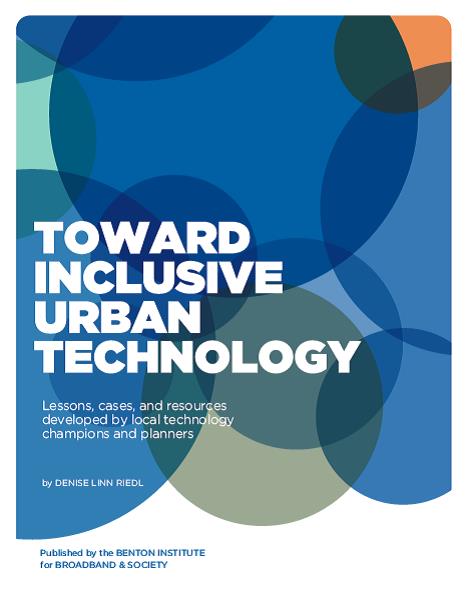Smart Cities, Inclusive Technology, and Public Service
Monday, June 8, 2020
Digital Beat
Smart Cities, Inclusive Technology, and Public Service

Over two years ago when I began my fellowship with Benton, I recognized how our cities are changing at an incredible pace. The technology being deployed on our sidewalks and streetlights has the potential to improve mobility, sustainability, connectivity, and city services. Of course, technology can be divisive as well as progressive. Does the potential of the 21st Century data-collecting, responsive, hyperconnected city benefit us all equally? Is it built with resident understanding, feedback, and consent?
As my work on Toward Inclusive Urban Technology was nearing completion in late February, I envisioned that the report would act as a guide for any local worker—inside or outside of government—who is helping to plan or implement technological change in their community. The people that inspire me most have always been those peer workers across the country who can speak both tech and civic engagement; they grapple with planning for and implementing new technology in their communities while championing inclusiveness and equity.
By mid-March of 2020, the world changed. In response to COVID-19, communities deployed technologies such as remote temperature monitoring systems, real-time heatmaps of crowding in public spaces, drones spraying disinfectants, and robots acting as “safe-distance ambassadors” to help us safely navigate the deadliest pandemic of our lifetime.
Obviously, these innovations were rolled out quickly during an unprecedented public health challenge, but not all efforts are. Many local technology and data projects can and should happen at the speed of consensus. Toward Inclusive Urban Technology catalogs cases of communities doing just that.
Many of the civic engagement tips and lessons compiled by myself and my collaborators in Toward Inclusive Urban Technology are not novel—they are simply (and unfortunately) atypical within the context of urban technology projects. Urban planners and civic organizers will find the best practices quite familiar because they are commonly seen in the way cities do neighborhood strategic planning with residents. It’s just time that we held technology rollouts—whether they are sensors, drones, or new fiber networks—to the same standard of inclusion.
I began this project with a simple question: What does procedural justice look like when we roll out technology into public spaces? As it turns out, procedural justice could take many forms depending on the project and the community context. There are several commonalities that run through them all: authenticity, two-way communication, and trust.
The first step in modifying people’s behaviour to align with the greater good is to design a system that builds trust between the citizens and the city. Providing citizens with timely and credible information about important issues and busting falsehoods goes a long way in creating trust. It helps people to understand which behaviours are safe and acceptable, and why this is for the benefit of the society and their own long-term interest.
Despite the realization that smart city technology in and of itself is not transformational, there’s still room for optimism about the future of technology in cities. That optimism is fueled by the people who helped create Toward Inclusive Urban Technology. Among them are government project managers, advocates, data analysts, academics, and lawyers. Each is an expert in their role, but each also is passionate about making sure that residents are included in planning our future cities.
While 21st-century technology necessitates new policies and programs in our cities, it also requires cultivating and training passionate, competent people who know enough about technology to lead technical projects and enough about policy and civic engagement to protect the public interest.
Each of the collaborators who have contributed to Toward Inclusive Urban Technology hit that sweet spot. I’m honored to have worked with them and I look forward to leaning on them in the future.
Mayor Pete Buttigieg named Denise the Chief Innovation Officer for the City of South Bend (IN) at the end of January 2019. Previously, Denise was in charge of Ecosystem Development at Chicago’s City Tech Collaborative. Denise has diverse experiences in telecommunications policy and planning, digital inclusion, and emerging smart city technologies. During her Benton Fellowship, she will ask: As cities strive to be “smarter,” and more and more technology is placed in the public way, how can we make sure smart city projects (whether they are IoT sensors, small cell deployments, WiFi Kiosks, or other new fixtures to our neighborhoods) are planned with residents and align with the public interest? Denise is the co-author, with Blair Levin, of The Next Generation Network Connectivity Handbook: A Guide for Community Leaders Seeking Affordable, Abundant Bandwidth (December 2016).
The Benton Institute for Broadband & Society is a non-profit organization dedicated to ensuring that all people in the U.S. have access to competitive, High-Performance Broadband regardless of where they live or who they are. We believe communication policy - rooted in the values of access, equity, and diversity - has the power to deliver new opportunities and strengthen communities.
© Benton Institute for Broadband & Society 2020. Redistribution of this email publication - both internally and externally - is encouraged if it includes this copyright statement.
For subscribe/unsubscribe info, please email headlinesATbentonDOTorg







